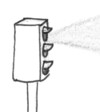h a l f b a k e r yAlmost as great as sliced bread.
add, search, annotate, link, view, overview, recent, by name, random
news, help, about, links, report a problem
browse anonymously,
or get an account
and write.
register,
|
|
|

Forget flywheels or batteries: use hydraulics.
When stopping, use the inertia of the car to jack up the body of the vehicle above the road wheels.
Then release the stored energy to start the car moving again.
Real wacky racers style.
 .
[FarmerJohn,
Nov 29 2004]
.
[FarmerJohn,
Nov 29 2004]
Hoppin Lowriders
http://www.lowrider...1lrm_sanantoniohop/
If anyone could build it, these guys could. [wagster, Nov 27 2004]
[link]
|
| |
A reverse wheelie on start? |
|
| |
It has the advantage of working just as well for busses, etc... as for little cars. Heavier cars need more energy to get going or to stop, but also can store more when they are lifted. |
|
| |
On the other hand, there has to be a real limit to the height as I can see a panic stop with the wheel turned to avoid something in your path with the result that your car launches itself into the air and tumbles sideways. |
|
| |
Nice one [Ling]! That's about as half baked as they come. Also quite buildable. |
|
| |
We need an illustration for this - FJ? |
|
| |
[2FSOAHM], thanks.<deleted various comments> |
|
| |
Assuming that the entire weight of the vehicle could be lifted (i.e. that the parts like wheels that had to stay on the ground had zero mass), storing the energy from travelling at 25mph would require raising the vehicle over 20 feet. If the vehicle were going 50mph, the distance would be more than 83 feet. At 70mph, over 160 feet. |
|
| |
If the vehicle were limitted to being elevated 10 feet (which is still too much to be practical) the speed it could attain on descent would be less than 18mph. If the limit were 5 feet, the speed would be about 12mph. |
|
| |
Drat and double drat: Professor Pat Pending used to do it all the time (admittedly so that he could avoid Dick Dasturdly's traps). |
|
| |
Thank you FJ! Brilliant as usual. |
|
| |
Great for very crowded roads,
you have to go slow anyway, and
there's lots
of stopping and starting. |
|
| |
<advertisement voice> When
driving down a hill,
instead of using wasteful
friction brakes, simply jack the
car up roughly the height of the
hill. You can't refill the tank
but that's okay. You've saved
so much energy it won't need it
'till next week! </advertisement
voice> |
|
| |
hey energy! the idea is from Ling! credit where credit due. |
|
| |
[Po] I was thanking him for the illustration. [Ling] sorry for the confusion. Its a fun idea, and I bunned it. |
|
| |
Must say that I thought this would be an idea for stopping car-jackers... hmmm. Maybe I should move to a better part of town. |
|
| |
Interesting idea [Ling], made me laugh. |
|
| |
Hrmmm ... if you put a penny in the back could we make it do wheelies?! |
|
| |
[+] neat clean little idea. Nice illustration too. |
|
| |
[supercat] thanks for the calcs. But wouldn't that be the same case for any other regenerative braking scheme? The merits of this one would not be in the magnitude of the energy, but in the relative efficiency of this method over other methods. |
|
| |
Doh! I just fouled and made an anno that was longer than the idea! |
|
| |
Not only am I bunning the idea but I'm also gonna randomly bun one of FJ's ideas for the pic. [+] [+] |
|
| |
FJ, I've been looking at a picture of a truncated traffic light, wondering why there were all these comments. |
|
| |
In the "personal grooming hummingbird" I noticed that there seemed to be something missing from the picture. Then I clicked on the little dark square ICON. |
|
| |
Aah......how stupid am I. |
|
| |
Now I see. Yes it is good! Thanks! |
|
| |
Should the thumbnail be a complete drawing, or only a small section of the drawing? |
|
| |
The in-line thumbnails are usually only sections of the main picture. It's a bit like a christmas present, you might guess what it's going to be but you're often surprised. |
|
| |
Can someone please delete [Brandon Mitchel]'s account? This is getting tedious. |
|
| |
Probably related to [Travbm] |
|
| |
Had to bone since the math says it won't work. There's simply
a LOT of kinetic energy to store. Note also, that you'd have to
transfer that energy to jacking the car up, which would
require a transmission of sorts, which are notoriously
inefficient. |
|
| |
Wait; are you saying there's *too much* available energy,
[EvilTronics]? I'm not contradicting you, but I'm wondering what
particular failure mode is predicted by the maths. |
|
| |
//^who he?// A spammer whose account was deleted. |
|
| |
[pertinax]
e = mgh = œmv²
=> h = œmv²/g |
|
| |
Let v = 60km/h = 16.666 m/s.
Then h = œ*16.666²/9.8 = 14.17m |
|
| |